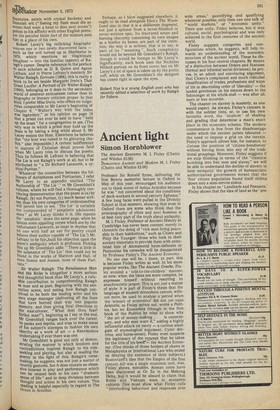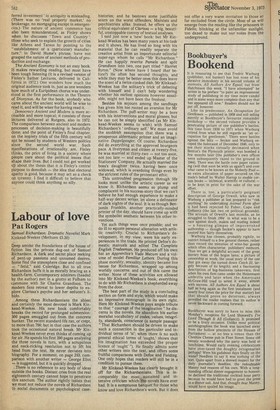Ancient light
Simon Hornblower
The Ancient Economy M. I. Finley (Chatto and Windus £3.50)
Democracy Ancient and Modern M. I. Finley (Chatto and Windus £2.00) Professor Sir Ronald Syme, delivering the first Bowra memorial lecture in Oxford in May of this year, encouraged his audience not to think worse of Aelius Aristides because he was " not concerned about the conditions of dock-workers in second century Ephesus." A few long faces were pulled in the Divinity School at that moment, showing that even in Oxford there are some who think that the prosopography of elites and novi homines is at best only part of the truth about antiquity. M. I. Finley, Professor of Ancient History at Cambridge has never been content merely to chronicle the doing of "rich men living peaceably in their habitations," such as Cicero and Pliny the Younger: those who look to their ancient historians to provide them with annotated lists of Alcmaeonid herm-defacers or Pannonian bis consules will be disappointed by Professor Finley's The Ancient Economy. No one else will be, I think. in part, this is because Finley writes so well. In his more popular works, like The Ancient Greeks, Finley avoided a 'told-to-the-children ' manner; so now, when the ideas are more complex, he expresses himself without resorting to anachronistic jargon. This is not just a matter of style: it is part of Finley's thesis that the language of modern economics cannot, without more, be used to analyse a period when the 'science of economics' did not yet exist. Aristotle, as Finley points out, wrote a Politics, but no Economics (though in the first book of the Politics he tried to show why "the art of money-making . . , is unnecessary, and why men want it," adding a highly influential attack on usury — a curious amalgam of etymological argument. Cynic doctrine, and horse-sense). Finley even suspects the legitimacy of the con,cept that he takes for the title of his boor--: the Ancient Economy. (One thinks of those holders of chairs in Metaphysics or International Law who ended up denying the existence of their subjects.) Rostovtzeffs idea that the Empire of the first century AD was a single economic unit, was, Finley shows, mistaken. Roman coins have been discovered at Oc Eo in the Mekong Delta; but it would be absurd to claim that Rome and Vietnam were in economic cahoots. One must show what Finley calls "interlocking behaviour and responses over wide areas," quantifying and qualifying wherever possible; only then can one talk of "world markets," or "economic unity." There was unity, Finley believes, but it was cultural, social, psychological and was only achieved in the final centuries of the ancient world.
Finley suggests categories and configurations which, he suggests, will help towards an understanding of the economic structure of the ancient world. These he discusses in his four central chapters. By means of a distinction between Orders and Statuses (formal and informal social divisions), he proves, in an adroit and convincing argument, that Cicero's complacent and much ridiculed classification of trades, professions and ways of life in descending order of 'liberality' — the landed gentleman on his estates down to the fishmonger at his whelk-stall — was after all, more or less accurate.
The chapter on slavery is masterly, as one would expect. As always, Finley's concern is with the subtler tints, or, to use his own favourite word, the ' nuances ' of shading and grading that determine a man's exact Place in the economic scheme. The modern commentator is free from the disadvantage under which the ancient jurists laboured — .the need to impose a grid on the terrain. Finley's approach allows him, for instance, to (.11scuss the position of 'citizen-bondsmen' without forcing them into any of the traditional groupings. Moreover, Finley suggests if we stop thinking in terms of the "classical bunching into free men and slaves," we will be able to understand the decline of slavery in later antiquity: the growth of bureaucratic authoritarian government meant that the 'free' citizen population found itself slidine down into a semi-servile status.
In his chapter on 'Landlords and Peasants,' Finley shows that the idea of land as the ' pre ferred investment' in antiquity is misleading. (There was no 'real property market,' no brokerage, no mortgaging except in emergencies.) The nature of ancient commerce has arso been misunderstood, as Finley shows When he discusses 'Town and Country ': those who seek to explain the growth of cities like Athens and Tarsus by pointing to the "establishment of a (particular) manufacture," in David Hume's phrase, have not grasped the nature of ancient methods of production and exchange.
The Ancient Economy is not an easy book. It makes rewarding reading, but must have been tough listening (it is a revised version of Finley's Sather Lectures, delivered in California in 1972.) One wonders how much the original audience took in, just as one wonders how much of a Euripidean chorus was understood at the first performance in the Theatre of Dionysus. As for the book, anybody who cares about the ancient world will be wise to read it, and will be wiser for having read it.
.Democracy Ancient and Modern is more accessible and more topical; it consists of three lectures delivered at Rutgers, also in 1972. The comparison between ancient and modern processes of decision-making is beautifully done; and the point of Finley's final chapter, an the impiety trials of the fifth century will not be missed by students of Western politics since the second world war. Such m,anifestations of irrationality are, Finley thinks, the price of living in a society where People care about the political issues that shape their lives. But I could not get worked UP about the thesis that it is Finley's central Purpose to demolish — the idea that electoral apathy is good, because it may act as a check on tyranny. I find it difficult to believe that anyone could think anything so silly.



































 Previous page
Previous page